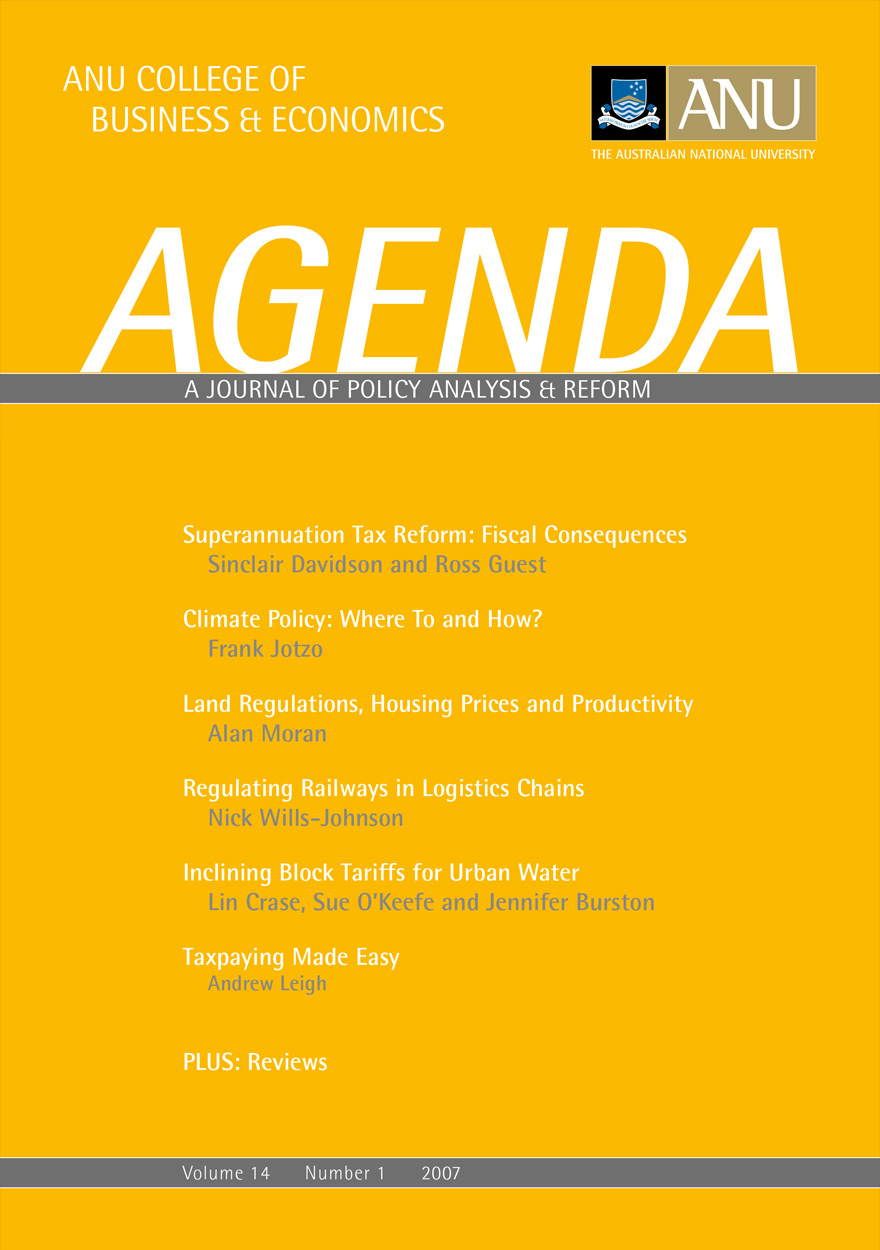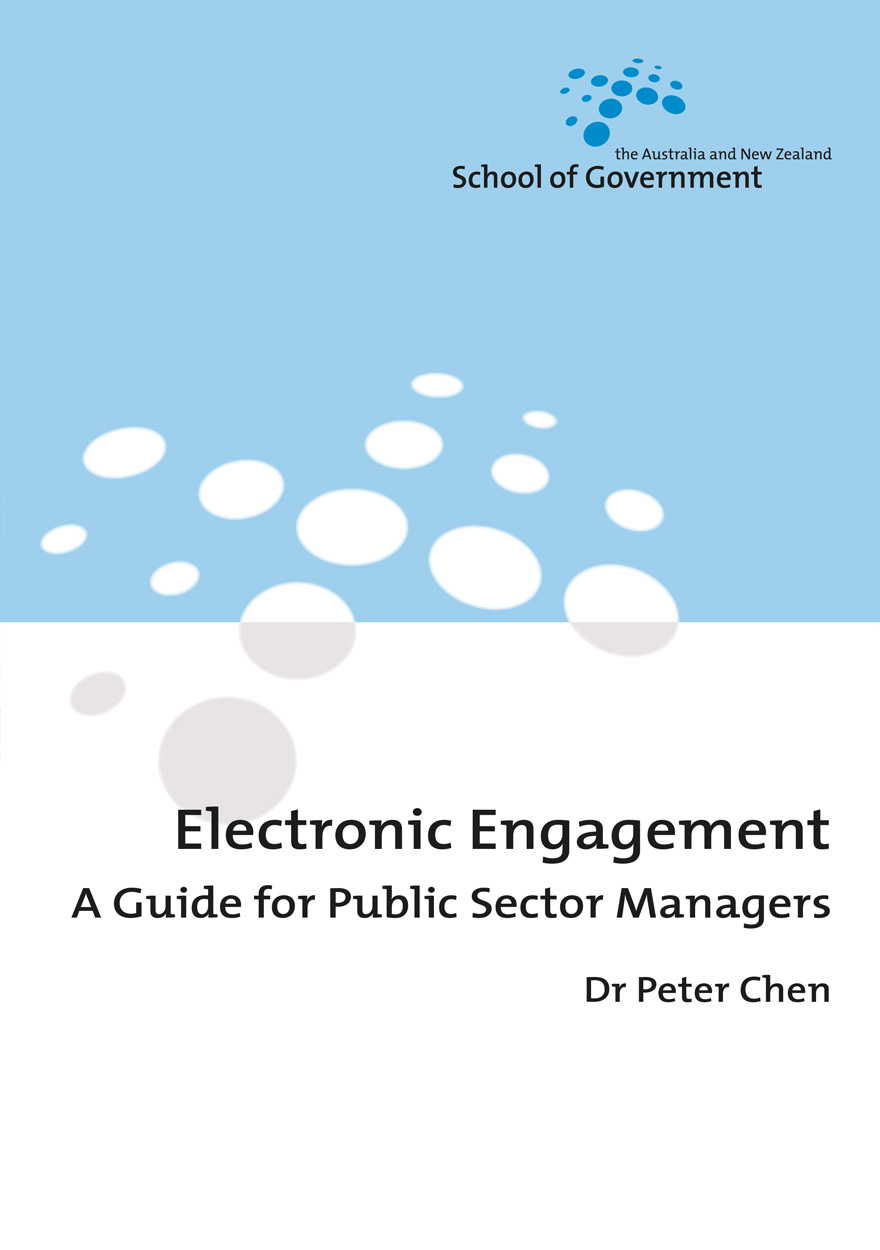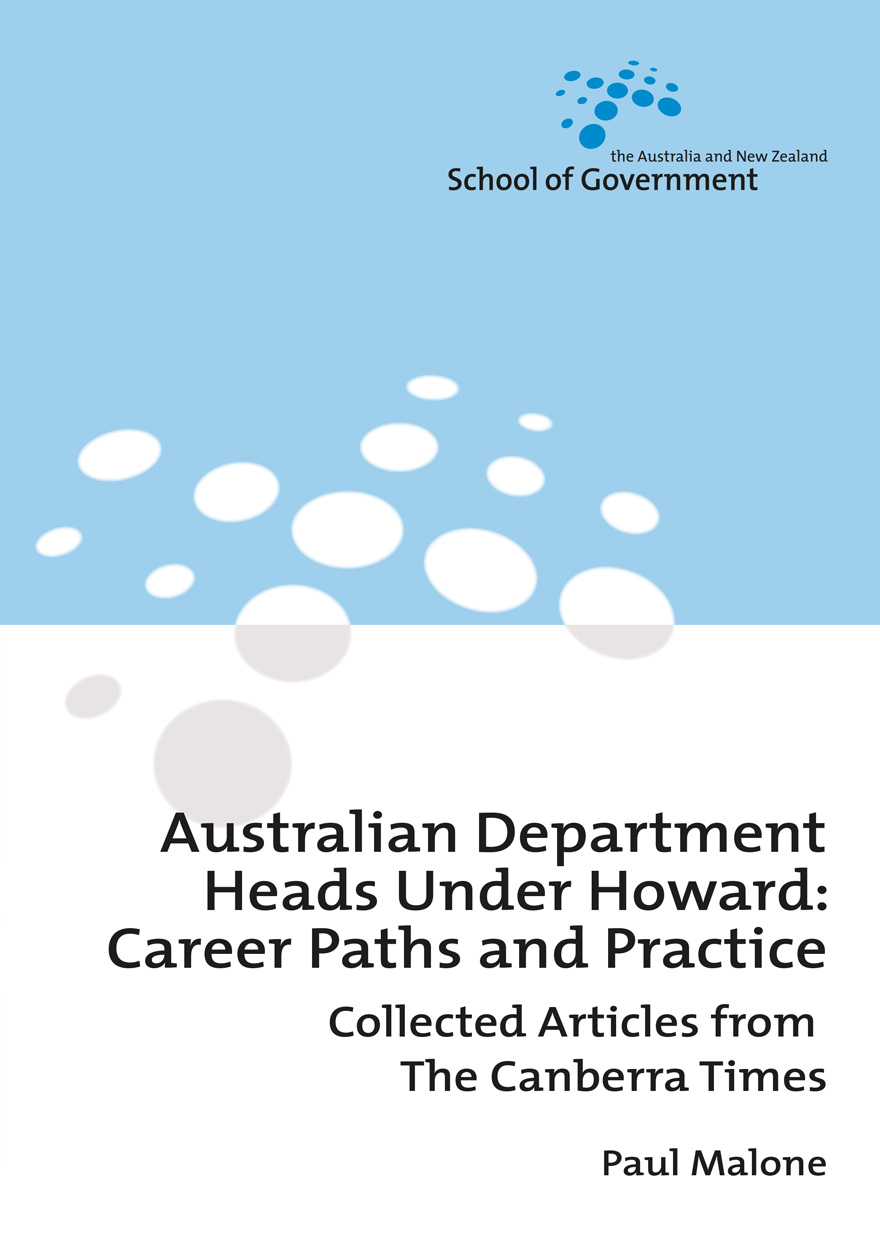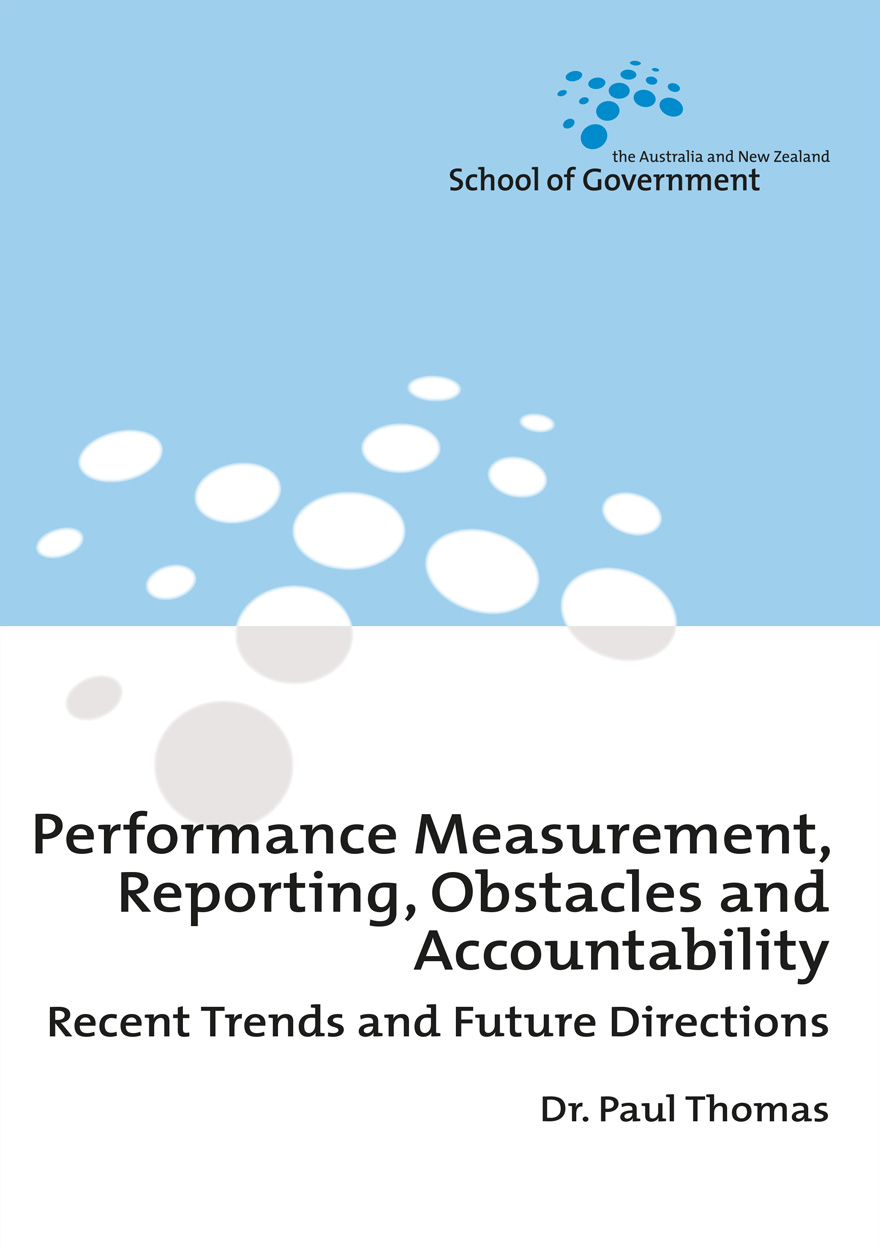Search titles
Displaying results 341 to 350 of 358.

Agenda - A Journal of Policy Analysis and Reform: Volume 2, Number 4, 1995 »
Publication date: April 2007
Agenda is a refereed, ECONLIT-indexed and RePEc-listed journal of the College of Business and Economics, The Australian National University. Launched in 1994, Agenda provides a forum for debate on public policy, mainly (but not exclusively) in Australia and New Zealand. It deals largely with economic issues but gives space to social and legal policy and also to the moral and philosophical foundations and implications of policy.
Subscribe to the Agenda Alerting service if you wish to be advised on forthcoming or new issues.
Download for free
Not available for purchase

Agenda - A Journal of Policy Analysis and Reform: Volume 1, Number 1, 1994 »
Publication date: April 2007
Agenda is a refereed, ECONLIT-indexed and RePEc-listed journal of the College of Business and Economics, The Australian National University. Launched in 1994, Agenda provides a forum for debate on public policy, mainly (but not exclusively) in Australia and New Zealand. It deals largely with economic issues but gives space to social and legal policy and also to the moral and philosophical foundations and implications of policy.
Subscribe to the Agenda Alerting service if you wish to be advised on forthcoming or new issues.
Download for free
Not available for purchase

Agenda - A Journal of Policy Analysis and Reform: Volume 1, Number 2, 1994 »
Publication date: April 2007
Agenda is a refereed, ECONLIT-indexed and RePEc-listed journal of the College of Business and Economics, The Australian National University. Launched in 1994, Agenda provides a forum for debate on public policy, mainly (but not exclusively) in Australia and New Zealand. It deals largely with economic issues but gives space to social and legal policy and also to the moral and philosophical foundations and implications of policy.
Subscribe to the Agenda Alerting service if you wish to be advised on forthcoming or new issues.
Download for free
Not available for purchase

Agenda - A Journal of Policy Analysis and Reform: Volume 14, Number 1, 2007 »
Edited by: Franco Papandrea, Graeme Wells
Publication date: April 2007
Agenda is a refereed, ECONLIT-indexed and RePEc-listed journal of the College of Business and Economics, The Australian National University. Launched in 1994, Agenda provides a forum for debate on public policy, mainly (but not exclusively) in Australia and New Zealand. It deals largely with economic issues but gives space to social and legal policy and also to the moral and philosophical foundations and implications of policy.
Subscribe to the Agenda Alerting service if you wish to be advised on forthcoming or new issues.
Download for free
Not available for purchase

Electronic Engagement »
A Guide for Public Sector Managers
Authored by: Peter Chen
Publication date: March 2007
Over the last twenty years, advanced communication technologies have become pervasive throughout Western society. These technologies have not only revolutionised the delivery of public and private services, they have shaped consumers’ expectations about service quality.
This guide (written for managers who have an interest in expanding their approach to public engagement, rather than IT professionals) assesses the value that new communications and computing technology can bring to interactions with a range of potential stakeholders.
An engaging, provocative and thorough survey of available technologies and potential applications, this is a ‘must read’ for policy and program practitioners who are considering options for electronic engagement.

Improving Implementation »
Organisational Change and Project Management
Edited by: John Wanna
Publication date: February 2007
The business of government is necessarily diverse, changing and of considerable scale. A focus on improving the implementation of government programs and initiatives is important because the community expects the Government to deliver on its policies, as does the Government.
The papers included in this collection address numerous aspects of improving implementation. They were initially presented at the Project Management and Organisational Change conference held in Canberra in February 2006, the first annual research conference organised by ANZSOG in conjunction with the Department of the Prime Minister and Cabinet. This collection represents a comprehensive drawing together of experience and insight from both practitioners and academic researchers, with speakers including top public sector executives from the Australian jurisdictions as well as representatives from the United Kingdom, Canada and New Zealand.

Globalisation and Governance in the Pacific Islands »
State, Society and Governance in Melanesia
Edited by: Stewart Firth
Publication date: December 2006
The Pacific Islands are feeling the effects of globalisation. Free trade in sugar and garments is threatening two of Fiji’s key industries. At the same time other opportunities are emerging. Labour migration is growing in importance, and Pacific governments are calling for more access to Australia’s labour market. Fiji has joined Samoa, Tonga, Tuvalu and Kiribati as a remittance economy, with thousands of its citizens working overseas. Meantime, Papua New Guinea and Solomon Islands grapple with an older kind of globalisation in which overseas companies exploit mineral and forest resources.
The Pacific Islands confront unique problems of governance in this era of globalisation. The modern, democratic state often fits awkwardly with traditional ways of doing politics in that part of the world. Just as often, politicians in the Pacific exploit tradition or invent it to serve modern political purposes.
The contributors to this volume examine Pacific globalisation and governance from a wide range of perspectives. They come from Papua New Guinea, Solomon Islands, Hawai’i, the Federated States of Micronesia, Samoa, Fiji, New Zealand and Jamaica as well as Australia.

Australian Department Heads Under Howard: Career Paths and Practice »
Collected Articles from The Canberra Times
Authored by: Paul Malone
Publication date: November 2006
The articles in this collection were first published in the Canberra Times between 14 November 2005 and 22 April 2006 in a slightly different format. In some cases two articles were published on the one secretary. These have been combined into one and minor edits and corrections have been made. The articles have not been updated to take account of events since they were first published.

Managing Consultants »
A Practical Guide for Busy Public Sector Managers
Authored by: Leo Dobes
Publication date: November 2006
A revised and updated 2016 edition of Managing Consultants is available.
Despite considerable investment in skills development, managers in public sector organisations still exhibit significant deficiencies in contract and relationship management skills and knowledge. This monograph is a practical, user-friendly guide to the benefits, perils and pitfalls of managing outside consultants.
Writing from years of experience in managing consultants in government, Dr Dobes guides on best practice, as well as including advice on what not to do, and how to rectify shortcomings in the process of using consultants effectively.

Performance Measurement, Reporting, Obstacles and Accountability »
Recent Trends and Future Directions
Authored by: Paul G. Thomas
Publication date: October 2006
This monograph identifies the ways that ‘politics’ enters into the creation of performance measurement systems, the selection of the official and unofficial aims of such systems, the selection of performance criteria and measures, the interpretation of findings, the responses to such findings and the implications of performance reporting for the accountability of both politicians and public servants. Along the way, both the conditions favouring and the obstacles to successful performance measurement will be highlighted.



